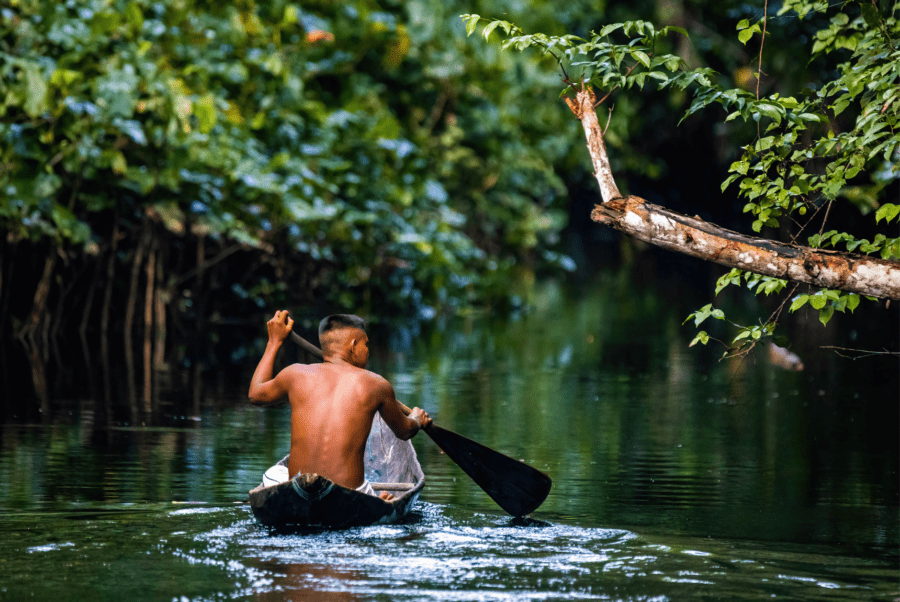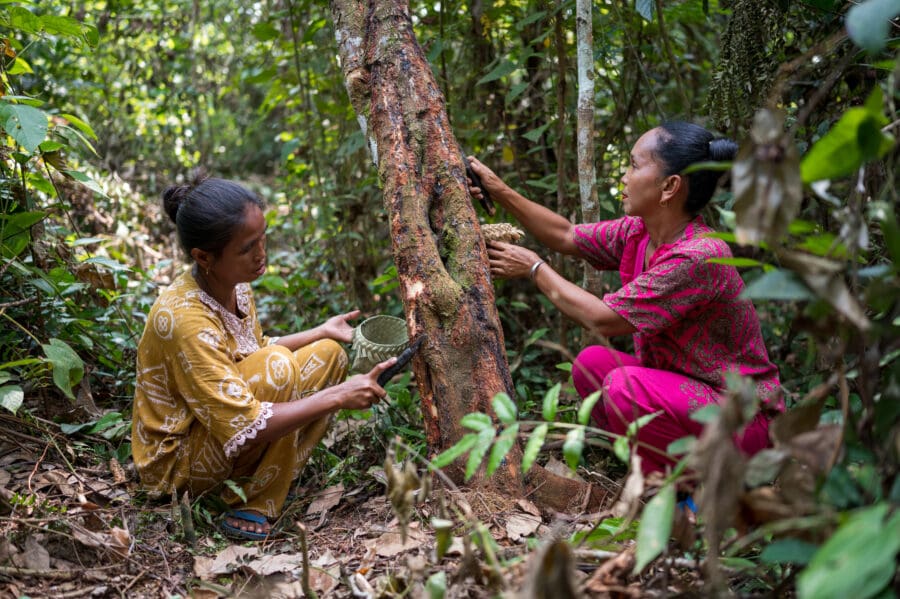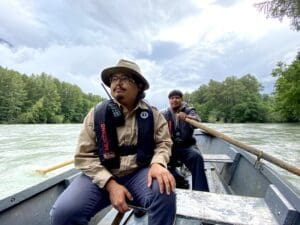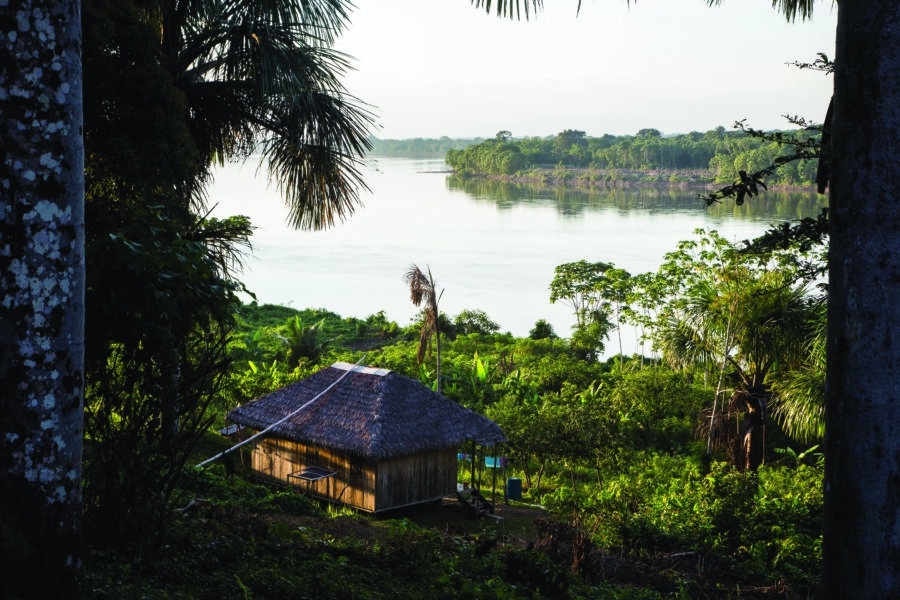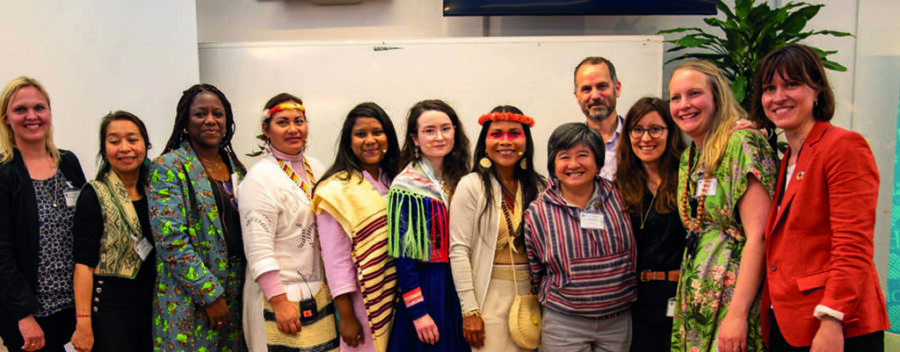MONTRÉAL (December 7, 2022) — An in-person and virtual event held on the sidelines of the UN Biodiversity Conference (CoP15) yesterday brought together Indigenous and local community representatives from North America and the Global South to share their struggles, initiatives, and solutions to the global biodiversity and climate crises.
The event was a first-of-its-kind gathering for North America, organized by the Rights and Resources Initiative (RRI), the Canada-based Conservation through Reconciliation Partnership (CRP), and the global ICCA Consortium in partnership with the Canada Research Chair in Human Rights, Health, and the Environment at McGill University. It was sponsored by Montréal International and The Christensen Fund.
Dr. Solange Bandiaky-Badji, Coordinator of RRI’s global coalition for Indigenous Peoples, Afro-descendant Peoples, and local communities, said in opening remarks, “This dialogue is the result of many conversations that have happened in the last year within the RRI coalition and with Indigenous organizations in North America. It is just the beginning of setting the groundwork for more collaboration and alignment on common priorities.”
Dr. Bandiaky-Badji expressed regret that many Indigenous leaders from the Global South were not able to join in person due to visa challenges in traveling to Canada, preventing many of the frontline defenders of the world’s biodiverse landscapes from joining the CoP15 proceedings.
“It is therefore our responsibility to convey these leaders’ demands for effective Indigenous and community participation in all levels of decision-making,” she added.
A diverse set of Indigenous leaders shared their communities’ traumatic struggles with dispossession, displacement and criminalization, as well as their self-determined priorities and responses. The peoples represented included the Karen of Burma/Myanmar, Kenya’s Maasai pastoralists and Sengwer, the Eastern Band of Cherokee Indians in the U.S., the Pankararu of Northeast Brazil, the Mosetén of Bolivia, the Sherpa of Nepal, the Sayisi Dene First Nation in Canada, the forest peasant communities of Mexico, and the Pygmy of the Congo, among others.
Holly Jonas, Global Coordinator for the ICCA Consortium, which co-organized the event said, “Indigenous Peoples and local communities face common challenges across the planet in realizing their self-determined priorities for their territories of life, both for their own health and wellbeing and for a healthy and sustainable planet for all.”
Jonas added that sharing experiences and building relationships and alliances are central to everything discussed at the dialogue and need to be brought forward to CoP15.
“What binds us together are these points of unity, convergence, and solidarity, and finding ways to work together and support each other through the challenges we’re all facing. Our hope now is for these experiences and recommendations to further bolster the growing momentum to recognize Indigenous Peoples’ and local communities’ rights and collective lands, territories, and resources at CoP15.”

What’s at stake?
From the tropical forests of the Congo Basin, the riverbanks of the Amazon, and the lands, forests, and waters of Turtle Island (North America), Indigenous Peoples and local communities have stewarded and sustained their lands for thousands of years. One study found that Indigenous territories harbor more biodiversity than protected areas in Brazil, Australia, and Canada. A 2021 report by the ICCA Consortium states that one of the biggest opportunities to catalyze transformative changes from local to global levels is to support Indigenous Peoples and local communities to secure their human rights, particularly their rights to self-determined governance systems, cultures, and collective lands and territories.
Yet, despite evidence that their guardianship leads to widespread social and ecological benefits, the role they play in biodiversity conservation and climate mitigation and adaptation has not been appropriately recognized nor protected by governments in the Global North and South. Today, the full and effective realization of collective territorial rights and self-determination remains a struggle across the globe.
Frank Brown, a hereditary Chief of the Heiltsuk First Nation from Bella Bella in British Columbia, Canada and Adjunct Professor in resource and environmental management at Simon Fraser University, in his keynote address called for a clear acknowledgment of historical injustices against Indigenous communities by national governments, international institutions, and global conservation groups.
“The wealth of this nation and others like it have been built on the resources of our people. When we move forward, it’s imperative that we do it in a sustainable way where the Indigenous Peoples take their rightful place.”
Brown, a senior advisor to CRP and the Indigenous Leadership Initiative, added that it isn’t just a seat at the table that Indigenous Peoples are seeking. “We want to be self-determining. We don’t want a filter of NGOs, nation-state governments, and philanthropists dictating to us what our priorities are… We can create our own priorities because we are the ones who have to live with these decisions.”
Christiane Pankararu, a Pankararu leader with the Articulation of the Indigenous Peoples of Brazil (APIB) emphasized the importance of stronger resistance by Indigenous communities to the principles of colonization and fortress conservation that continue to oppress Indigenous knowledge and stewardship in countries across the world. “The people making decisions on our behalf are stuck to colonialist systems of control of our knowledge, practices, and science. They see us as something minor that has to be proved inside a lab. But our experience is lived, gained through our knowledge and practices.”
Stanley Kimaren Ole Riamit, a Maasai leader from Kenya’s Indigenous Livelihoods Enhancement Partners (ILEPA), shared that a vast majority of Kenya’s protected areas are currently under fortress conservation, with just 11% under community-led conservation. He added that for his pastoralist community, mobility is central to utilizing its landscapes, despite being projected as irrational by governments in market-oriented policy decisions. “The landscape where I come from spans 45,000 kilometers of landscape that is the backbone of economies and a lifeline for communities as well as conservation,” Ole Riamit said.
“Indigenous Peoples carry a mindset of abundance as opposed to a scarcity mindset propagated by capitalist principles. To destroy the forest is to destroy ourselves.”
The participants also emphasized the urgency of including local and rural community women in conservation and climate finance. Cécile Ndjebet, president of the African Women’s Network for Community Management (REFACOF), said in her remarks, “The relationships we’re going to form here today, let these be the seeds for action and give us the force we need to show that we are equipped to defend our lands, our communities, our women. It’s only when we’re together that we can have enough strength to move forward.”
Ndjebet shared a global call to action by the recently created Women in Global South Alliance for Tenure and Climate, which she is a part of.
“We don’t need to prove Indigenous and community women’s role in restoring and protecting nature; the evidence is already there. What we need now is to ensure that these women have direct access to conservation funds.”
The participants identified several common challenges that present opportunities for global North-South collaboration. These included:
-
- Resisting colonial conservation and extractive ‘development’ models and initiatives in Indigenous Peoples’ and local communities’ lands and territories,
- Lack of inclusion or even silencing of Indigenous voices in global policy spaces,
- Power imbalances with governments, private sector interests, and NGOs,
- Declining youth engagement in their communities’ ways of life and cultural practices, and loss of intergenerational knowledge sharing, and
- Insufficient representation and funding for Indigenous and local community women.
They discussed emerging opportunities for Indigenous and community leadership in addressing the interlinked biodiversity and climate crises, and potential areas for key actors like governments, donors, and environmental NGOs to invest in to achieve a more just and equitable post-2020 Global Biodiversity Framework. The Framework, anticipated to be the major output of CoP15, will outline the global biodiversity goals that will guide investments and actions to protect nature and use it more sustainably and equitably for the next 10 years.
Concluding the dialogue, Noella Gray, co-lead for the International Policy Research Stream of CRP, said, “The rich conversations and stories shared today by the participants, with the initiatives they have taken to reclaim their customary lands, cultures, and stewardship, are just the first step in starting this much-needed dialogue. By combining our voices and working together, we can be a much stronger force for action.”

